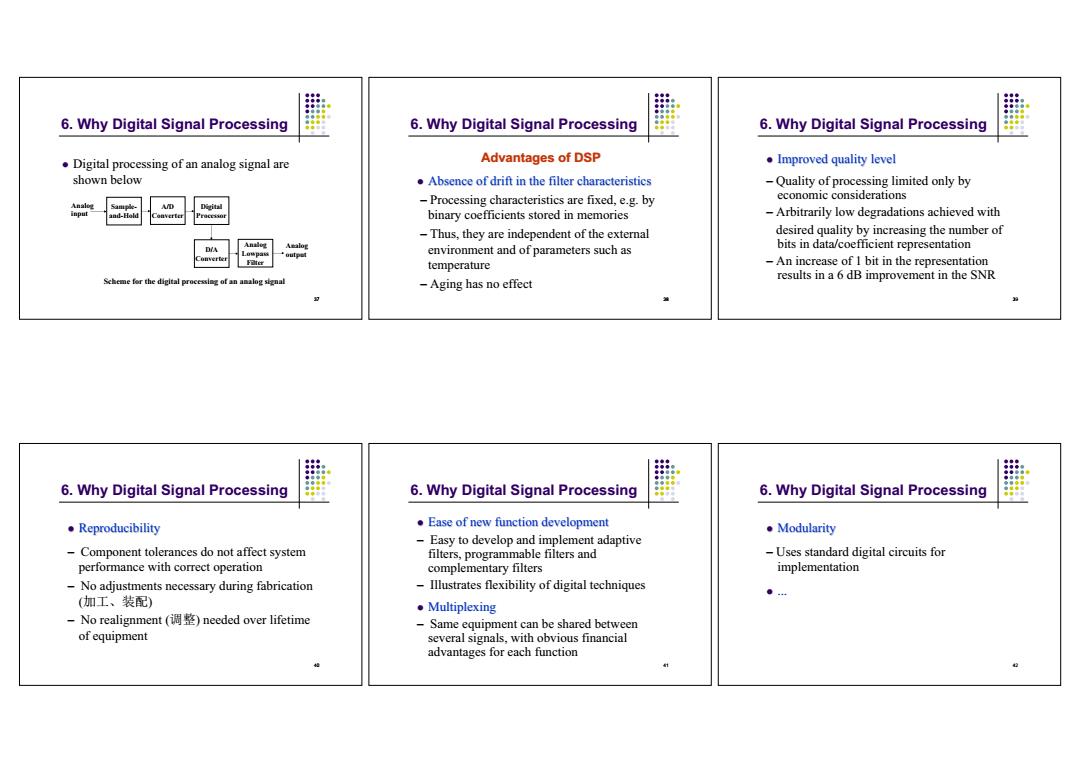正在加载图片...

6.Why Digital Signal Processing 6.Why Digital Signal Processing 6.Why Digital Signal Processing Digital processing of an analog signal are Advantages of DSP Improved quality level shown below Absence of drift in the filter characteristics -Quality of processing limited only by economic considerations 园巴 -Processing characteristics are fixed,e.g.by binary coefficients stored in memories Arbitrarily low degradations achieved with -Thus,they are independent of the external desired quality by increasing the number of 应图 environment and of parameters such as bits in data/coefficient representation temperature -An increase of I bit in the representation results in a 6 dB improvement in the SNR -Aging has no effect 6.Why Digital Signal Processing 6.Why Digital Signal Processing 6.Why Digital Signal Processing ●Reproducibility Ease of new function development Modularity -Easy to develop and implement adaptive Component tolerances do not affect system filters,programmable filters and -Uses standard digital circuits for performance with correct operation complementary filters implementation -No adjustments necessary during fabrication -Illustrates flexibility of digital techniques (加工、装配) 。Multiplexing -No realignment(调整)needed over lifetime Same equipment can be shared between of equipment several signals,with obvious financial advantages for each function37 Digital processing of an analog signal are shown below 6. Why Digital Signal Processing Scheme for the digital processing of an analog signal Sampleand-Hold A/D Converter Digital Processor Analog input D/A Converter Analog Lowpass Filter Analog output 38 Advantages of DSP Absence of drift in the filter characteristics Absence of drift in the filter characteristics – Processing characteristics are fixed, e.g. by binary coefficients stored in memories – Thus, they are independent of the external environment and of parameters such as temperature – Aging has no effect 6. Why Digital Signal Processing 39 Improved quality level Improved quality level – Quality of processing limited only by economic considerations – Arbitrarily low degradations achieved with desired quality by increasing the number of bits in data/coefficient representation – An increase of 1 bit in the representation results in a 6 dB improvement in the SNR 6. Why Digital Signal Processing 40 Reproducibility – Component tolerances do not affect system performance with correct operation – No adjustments necessary during fabrication (ᐕǃ㻵䝽࣐) – No realignment (䈳ᮤ) needed over lifetime of equipment 6. Why Digital Signal Processing 41 Ease of new function development Ease of new function development – Easy to develop and implement adaptive filters, programmable filters and complementary filters – Illustrates flexibility of digital techniques Multiplexing – Same equipment can be shared between several signals, with obvious financial advantages for each function 6. Why Digital Signal Processing 42 Modularity – Uses standard digital circuits for implementation ... 6. Why Digital Signal Processing��������